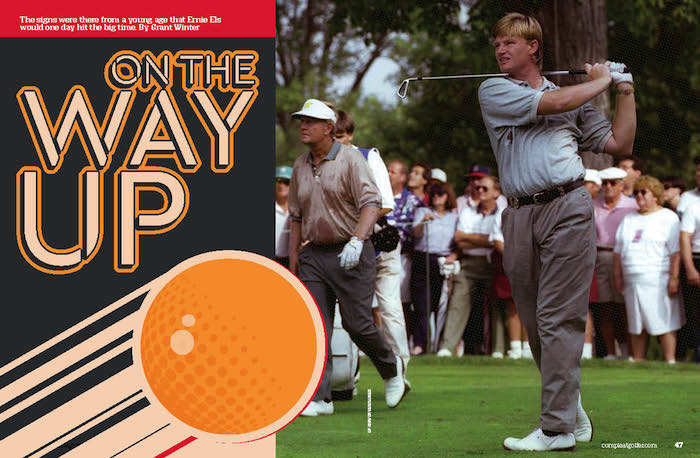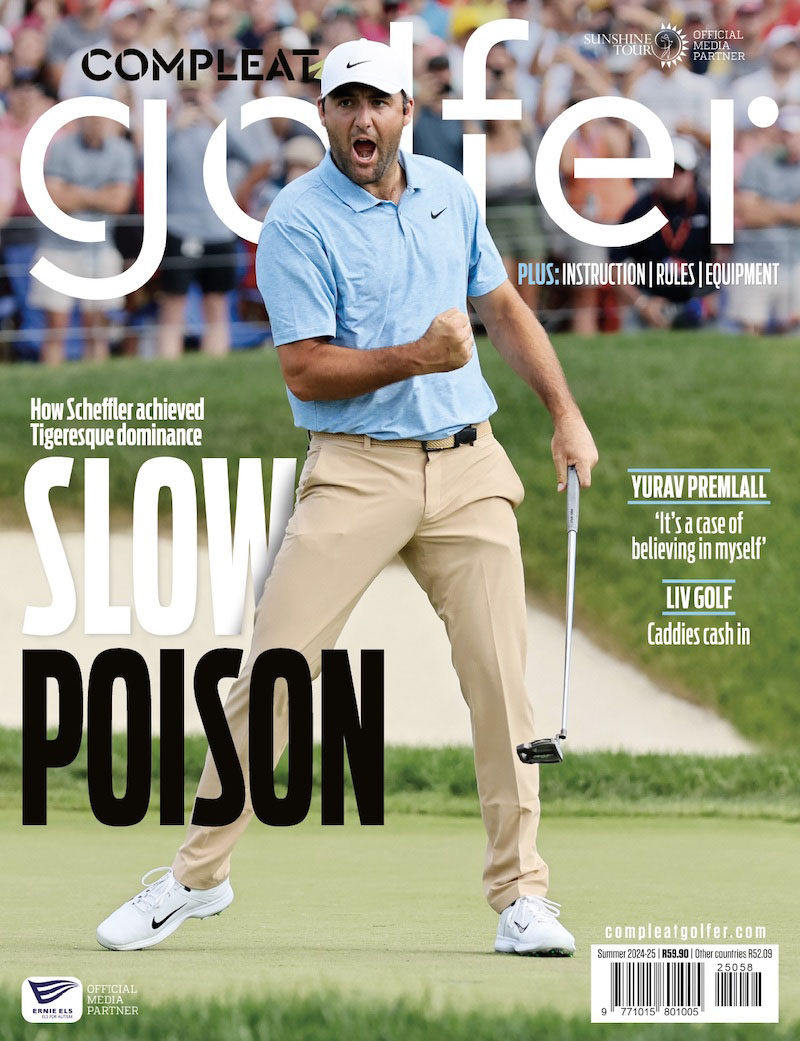The signs were there from a young age that Ernie Els would one day hit the big time, writes GRANT WINTER in Compleat Golfer.
Neels Els remembers well how he used to drop off his two golf-mad sons, Dirk and his younger brother Ernie, at Kempton Park Golf Club or Germiston Golf Club early in the morning during school holidays and leave them there to play all day. It was often so early that the gate was still locked and the young Els boys would have to wait for the manager to open up before eagerly heading to the 1st tee.
One day, after the usual early drop-off at Kempton Park, the sun had just gone down and it was almost dark when Dad got back to the club to pick them up. But they weren’t waiting for him. So he asked in the clubhouse: ‘Does anyone know where I can find Dirkie and Ernie?’
‘Look out there, Neels,’ he was told, ‘and through the gloom you might just be able to see them coming up the 18th.’
‘They had raced around 18 holes four times in one day, carrying their own clubs and playing against anyone who wanted some stiff competition,’ Neels recalls. ‘That’s how committed they were and how much they loved the game. They just couldn’t get enough golf. They liked to play against each other too, and although Dirk could hit the ball a long way, Ernie usually found ways and means to beat him, either by chipping it close or making the putts.’
Ernie’s mother, Hettie, says he started getting into the game when he was about six or seven. ‘And from the outset he was very keen. He just put his head down and got on with it. It was like he clicked very quickly and could hit a straight ball immediately. He joined the SA Golf Federation, who ran junior golf. They were very impressed with him and it wasn’t long before he was being picked for the provincial age-group teams.
‘His goal even in those days was to win Majors. He was fascinated, in particular, by Arnold Palmer and Jack Nicklaus – and even our own Gary Player – and we had to buy him books about them so he could read their biographies. When he wrote essays at school, they were all about Palmer and Nicklaus!’
Hettie also remembers how before a golf competition the next day, Ernie would meticulously prepare everything the previous evening. His immaculately kept clubs would be waiting at the front door to be picked up in the morning. ‘And he’d make sure everything he’d need was in perfect order – shirt ironed, shoes cleaned, even the shoelaces attended to, blazer ready, whatever. Only then was he ready to head for bed. He was always so excited and couldn’t wait for the next day.’
As he moved into his teens, Ernie also flourished at tennis (winning, at 13, an Eastern Transvaal junior title), rugby and cricket, but his parents, his equally supportive grandfather Ernie Vermaak and the boy himself decided he should concentrate on golf if he was going to make a career of it. ‘He figured he didn’t want just a random bit of this and that, so it made sense to concentrate on golf,’ says Hettie. ‘Neels and I realised he was happy about this and it was the way to go.’
Neels was a good golfer himself, getting down to a one-handicap at his peak, while Dirk – like Ernie – was hugely talented and would go on to play provincial golf for Eastern Transvaal and spend a short spell in the paid ranks. But mothers know a thing or two and Hettie always believed Ernie was destined for great things as a golfer.
‘He was so strong in his head out on the course, so strong-minded. He seemed to be able to forget about anything and just concentrate on his golf. And I was so impressed with how he kept his nerves under control. I used to think, “Gosh, I wish I could be like that.”’
Yes, mothers do know a thing, and years later Hettie would predict before the 1997 US Open at Congressional and the 2002 Open Championship at Muirfield that Ernie would win the tournament.
I can testify to this because I was standing next to Hettie at Muirfield during a practice round and she said to me: ‘You know, Grant, Ernie’s going to win this week.’ That Sunday evening her son proved her right. How do moms know these things? ‘It’s something you can’t really explain, but I think it’s the same for all mothers,’ she replied. ‘Maybe it’s intuition, but – in Ernie’s case – the look on his face, his body language, the way he talks. It’s that bond between a mother and a child.’
Ernie’s first win of note as a junior was at the Lonehill Mini Masters at age 13 and he repeated the feat the following year, in 1984, his handicap then down to scratch. Later that year he headed to San Diego and the World Junior Championships, where he won the U14 division with a 54-hole return of 214, beating one Phil Mickelson on 217 into second place.
On to 1986 and a 16-year-old Ernie became the youngest winner in the 96-year history of the South African Amateur, held that year at East London Golf Club. Not only did the lineup include the very best of South Africa’s amateurs, but also four top players from the Republic of China who were in the country to play Test matches. After finishing third in the 36-hole strokeplay qualifier, Ernie won his way through to the 36-hole final in the matchplay, where he beat compatriot and hot pre-match favourite Tony Louw 5 & 3. Ernie chipped in once from what Louw described as an ‘impossible lie’ and, in addition, chipped and one-putted 16 times for birdies or pars in the 33 holes the match lasted. ‘Ernie has no nerves,’ was Louw’s assessment of the final.
For Ernie it was then a return to his desk at Jan de Klerk High School in Primrose, Germiston, and a word of thanks to the headmaster who gave him permission to take a week off. ‘I think my headmaster will be rather pleased,’ young Els said at the time. One of the first to congratulate Ernie was Bobby Locke. In a letter to ‘Ernest’, the old maestro wrote: ‘Just a few lines to congratulate you on your wonderful win at the South African Amateur at East London, and to win on that great course is a wonderful achievement!!!’
Adrian Frederick, one of South Africa’s greatest golf writers whose career was cut short after a car accident in 1986 which left him with brain damage and who passed away this year, wrote in the Star at the time: ‘Though the young “witkop” is unassuming, there is an air of self-confidence and determination that radiates from him. He knows where he’s headed – to the top.’
Between 1986 and 1989, when Ernie turned professional, he won just about everything there was to win as an
amateur in South Africa, including the SA Amateur Stroke Play title at Maritzburg Country Club in March 1989, aged 19, while doing his national service. In 1988 he won the Tillman Trophy in Britain and in January 1989 he finished fourth – and the leading South African (pro and amateur) – at the SA Open won by American Fred Wadsworth. And of course he distinguished himself playing for Gauteng North – known as Northern Transvaal in his day – and South Africa.
At one stage Ernie and his family were considering taking up one of several offers of golf scholarships he received from American universities but, such was his talent, it was decided it would be wiser to fast-track him into the professional ranks and shortly before his 20th birthday, on
17 October 1989, he signed on the dotted line. That October he graduated cum laude by finishing first at the PGA Qualifying School at Randfontein Estates with a 14-under-par 278 aggregate, a Tour School record which was eight strokes ahead of the next man. He did make a double-bogey on the first hole he played that week but tore round the final nine in the last round in just 30 strokes, playing the last four holes in four under par, courtesy of two birdies, a par and an eagle. It was an explosive finish and just a small taste of things to come – like 70 wins as a professional.
And now for the over-50s Champions Tour and Hettie Els feels her son is in a good place. ‘It’s a new beginning. Neels and I had a talk with him; like, is he going to enjoy it? Well, it seems he’s ready and looking forward to being there alongside Retief Goosen and his old friends from the regular Tour. My mind is at ease and I think he’ll do well.’ And mothers know.








